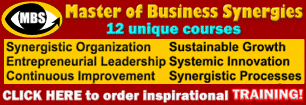|
Knowledge What Your Firm Knows to Create Value |
|
by Vadim Kotelnikov, Founder, The first-ever BUSINESS e-COACH for Innovative Leaders, 1000ventures.com
"Knowledge is of two kinds. We know a subject ourselves, or we know where we can find information upon it." - Samuel Johnson
|
Knowledge Defined Knowledge is a set of understandings used by people to make decisions or take actions that are important to the company. As opposed to "information" that is, knowledge is defined by its use and its relevance to work. It should be linked to the building blocks of how the organization creates value, especially unique know-how and capabilities.1 Knowledge as the Source of Business Value In the new economy, the knowledge component of products and services has increased dramatically in importance and has become the dominant component of customer value. The shift to knowledge as the primary source of value, makes the new economy led by those who manage knowledge effectively - who create find, and combine knowledge into new products and services faster than their competitors. "Knowledge includes all the valuable concepts and vital know-how that shape a business to be wanted and needed by customers. Companies that are fast to market and demonstrated an ability to move with speed and sustain speed view time and knowledge as assets that are real money in the bank."4 Explicit and Tacit Knowledge All knowledge isn't the same. There is explicit knowledge - the kind that can be easily written down (for example, patents, formulas, or an engineering schematic). The explicit knowledge can create competitive advantage, but its half-life is increasingly brief, as it can be replicated easily by others. Tacit knowledge, or implicit knowledge, is far less tangible and is deeply embedded into an organization's operating practices. It is often called 'organizational culture'. "Tacit knowledge includes relationships, norms, values, and standard operating procedures. Because tacit knowledge is much harder to detail, copy, and distribute, it can be a sustainable source of competitive advantage... What increasingly differentiates success and failure is how well you locate, leverage, and blend available explicit knowledge with internally generated tacit knowledge".3
|
Bibliography:
-
"The Centerless Corporation", Bruce A.Pasternack and Albert. J. Viscio, 1998
-
"Smart Business", Dr. Jim Botkin, 1999
-
"Relentless Growth", Christopher Meyer, 1998
-
"It's not the BIG and eats the SMALL... it's the FAST that eats the SLOW", Jason Jennings and Laurence Haughton, 2000


